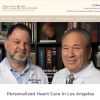Advancements in Heart Disease Research: Breakthroughs Shaping the Future of Cardiovascular Health
- Understanding Heart Disease and Its Impact
- Recent Breakthroughs in Heart Disease Research
- Promising Treatments and Innovations in Cardiovascular Health
- The Role of Technology in Advancing Heart Disease Research
- Real-Life Cases: Transformative Impact of Research on Heart Disease
- Looking Ahead: The Future of Heart Disease Treatments
1. Understanding Heart Disease and Its Impact
Heart disease is one of the leading causes of death globally, affecting millions of people each year. The term "heart disease" encompasses a wide range of conditions, including coronary artery disease, heart failure, arrhythmias, and valvular heart diseases. Understanding these conditions and their effects on cardiovascular health is essential for grasping the significance of the ongoing advancements in heart disease research.
Heart disease often develops over many years, with risk factors such as poor diet, lack of exercise, smoking, and genetics contributing to its onset. With advancements in research, medical professionals have been able to gain deeper insights into the underlying mechanisms of these diseases, paving the way for more effective treatments.
2. Recent Breakthroughs in Heart Disease Research
Over the last few decades, there have been significant breakthroughs in heart disease research. From groundbreaking genetic discoveries to new drugs and therapies, the landscape of cardiovascular health is constantly evolving. Here are some of the most notable recent advancements:
- Genetic Insights into Heart Disease: Researchers have made significant progress in identifying specific genes that increase the risk of heart disease. These genetic discoveries could lead to personalized treatments tailored to an individual’s genetic profile, reducing the risk of heart disease and its complications.
- Revolutionary Heart Failure Medications: The development of new medications for heart failure, such as SGLT2 inhibitors, has dramatically improved the prognosis for patients suffering from this debilitating condition. These medications help reduce hospitalizations and improve heart function.
- Stem Cell Therapy for Heart Regeneration: Stem cell therapy has shown promise in regenerating damaged heart tissue and improving heart function. Although still in the experimental phase, this treatment could offer a new lease on life for individuals with severe heart damage.
3. Promising Treatments and Innovations in Cardiovascular Health
In addition to genetic breakthroughs and stem cell therapies, several other promising treatments have emerged in the field of heart disease research. These innovations are bringing hope to millions of people affected by cardiovascular diseases.
- Minimally Invasive Heart Procedures: Advances in minimally invasive surgery techniques, such as catheter-based interventions and robotic surgeries, have made heart disease treatments less invasive and more effective. Patients can recover faster, and complications are minimized.
- Artificial Intelligence in Heart Disease Detection: Artificial intelligence (AI) is revolutionizing the detection and management of heart disease. AI algorithms are being used to analyze medical images and predict the risk of heart disease with greater accuracy, enabling early intervention and personalized treatment plans.
- Improved Stent Technology: Stents, which are used to treat narrowed or blocked arteries, have also seen significant advancements. New drug-eluting stents are designed to release medication that prevents the re-narrowing of arteries, providing long-term benefits to patients.
4. The Role of Technology in Advancing Heart Disease Research
Technology has played a pivotal role in the advancement of heart disease research. From high-tech diagnostic tools to cutting-edge treatments, technology is helping scientists and healthcare professionals make strides in understanding and treating heart disease. Some of the key technological innovations include:
- Wearable Heart Monitors: Wearable devices that track heart rate, blood pressure, and other vital signs are helping individuals manage their cardiovascular health. These devices allow for continuous monitoring and early detection of any irregularities.
- Advanced Imaging Techniques: Advances in imaging technologies, such as MRI and CT scans, have made it possible to detect heart conditions with unprecedented precision. This allows doctors to diagnose heart disease at earlier stages, improving treatment outcomes.
- Telemedicine and Remote Health Monitoring: With the rise of telemedicine, patients can now consult cardiologists remotely, ensuring they receive the care they need, even in remote areas. This technology has become especially crucial during the COVID-19 pandemic.
5. Real-Life Cases: Transformative Impact of Research on Heart Disease
The real-world impact of advancements in heart disease research is best understood through personal stories. Take, for instance, the case of John Doe, a 58-year-old man who had been struggling with heart failure for years. Thanks to a groundbreaking drug trial involving SGLT2 inhibitors, John was able to experience a remarkable recovery. His heart function improved significantly, and he no longer needed to be hospitalized.
Similarly, Jane Smith, a 45-year-old woman with a family history of heart disease, benefited from genetic testing that revealed her heightened risk of developing cardiovascular issues. Armed with this knowledge, she was able to make lifestyle changes and start a preventative treatment plan that has kept her heart healthy.
6. Looking Ahead: The Future of Heart Disease Treatments
The future of heart disease research is incredibly promising. With continued advancements in genetics, personalized medicine, and technology, the ability to prevent, diagnose, and treat heart disease is rapidly improving. Researchers are working on developing new therapies, such as gene editing and advanced regenerative treatments, which could potentially reverse heart disease altogether.
As we look ahead, it’s clear that the future of heart disease treatments will be more tailored, less invasive, and increasingly effective. If you or a loved one is struggling with heart disease, staying informed about the latest advancements is essential. For more information on cutting-edge treatments and heart health innovations, visit trusted sources such as reputable medical websites or consult with your healthcare provider.




















